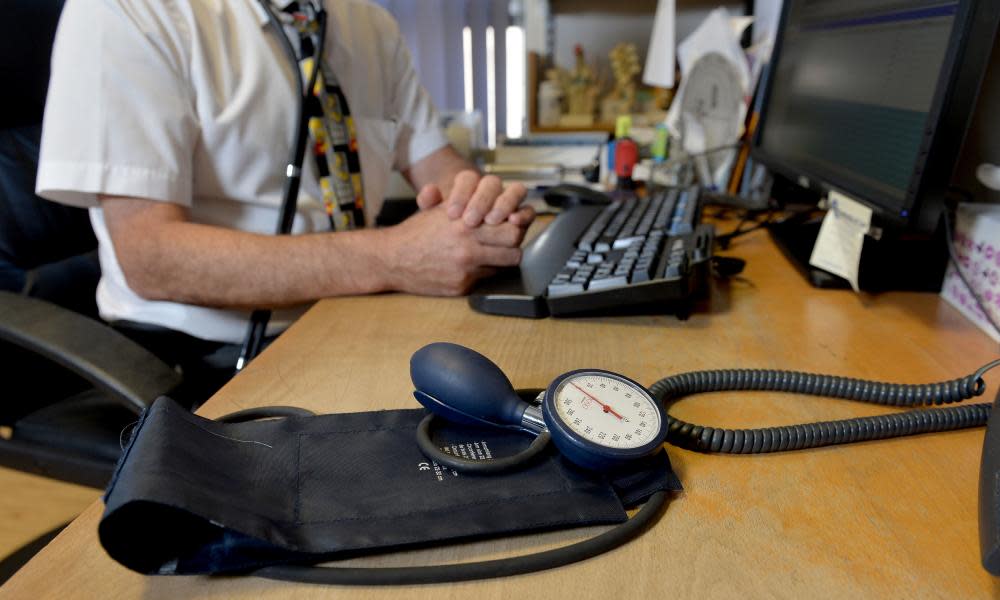Soaring private healthcare use piling pressure on NHS GPs, survey finds

Soaring use of private healthcare for tests and treatments is piling pressure on overstretched GP surgeries, with family doctors warning that standard NHS care is being squeezed as a result.
Record numbers of people are paying for private healthcare, with some having procedures such as cataract surgery and hip replacements, amid mounting frustration at NHS hospital waiting lists. Others are opting for private health checks, genetic testing or cosmetic surgery such as liposuction.
But the surge in private healthcare use is increasing the workload of GPs, many of whom say they are increasingly having to interpret questionable health checks done privately, organise blood tests or scans and manage additional administration related to private care. Some say more of their hours are being taking up providing follow-up appointments after patients paid for treatment or surgery abroad.
One GP said that “NHS general practice is being abused and subsidising lucrative private practice that is charging patients extortionate fees”. Another family doctor said having to deal with questionable medical requests for patients from private healthcare providers that “we don’t clinically agree with” was taking time and appointments away from standard NHS patients.
Dr John Puntis, the co-chair of the Keep Our NHS Public campaign group, said: “This is a sorry picture not only of hard-pressed GPs having their workloads and stress levels unnecessarily increased, but also patients duped by the private sector into paying out cash for sometimes dubious tests, diagnoses and procedures without adequate provision for follow-up advice and care.”
The workload of almost half of GPs has grown as a result of people using more private healthcare, according to the results of a survey reviewed by the Guardian and undertaken by Pulse, the family doctors’ magazine.
In the survey of 860 GPs, 46% of family doctors report that their workload has increased amid the surge in private healthcare use. One in 10 said their workload had “significantly increased” as a result.
Dr Emma Nash, a GP in Portchester, Hampshire, said she had seen a huge increase in workload related to private healthcare.
“First, it’s additional administrative workload for us – things like blood test requesting and reviewing results and communicating, as well as time spent reading extensive reports. This extra to our usual – already excessive – workload.
“However, the most frustrating bit is when we receive reports or requests that we don’t clinically agree with or don’t understand the rationale behind. These then do take appointments away from NHS patients because once we’ve received information we can’t ‘un-know’ it.”
Nash said this mainly applied when someone has a “vast array of tests” with a private health firm who then leave it to GPs to discuss the results with the patient.
“Other time is spent on consultations where the private clinician has recommended a referral. Sometimes this is inappropriate because the patient doesn’t meet the criteria, other times it should have just been done by the private clinician. This can be a challenging consultation – again one that wasn’t necessary.”
Requesting tests is “more than just ticking boxes”, Nash said. “We become legally responsible for reviewing, interpreting and acting on results which is time-consuming.”
She added: “Although we are not obliged to do these tests or prescriptions, it can be very difficult when a patient has been told what to expect. The NHS has to pick up the products of private work – however appropriate or inappropriate they are.
“While not all aspects of this take away time provision for standard NHS care, many do. It’s also the psychological impact of this workload too – we’re already swamped by our own work – NHS-generated. This is an escalating problem that is eroding morale and contributing to burnout.”
Dr David Coleman, a GP in Doncaster, said private ADHD queries alone were generating a “couple of hours extra work every week for the practice at the moment”.
Dr Zishan Syed, a GP in Kent, said: “NHS general practice is being abused and subsidising lucrative private practice that is charging patients extortionate fees while expecting GPs to soak up the complicated administrative work pro bono. This is ridiculous and makes a farce of the NHS and the taxpayer.”
Syed said current guidance on the private and NHS interface was “laughable”. Nash also said the rules were “not fit for purpose”.
Cat Hobbs, the director of public-ownership campaign group We Own It, said: “We need the government to reinstate our NHS as a fully public service and fund it properly. Otherwise we will continue to drift into a wasteful, American-style two-tier system where our GPs increasingly can’t cope.”
Prof Kamila Hawthorne, chair of the Royal College of GPs, warned the UK must “guard against creating a two-tier system that favours those who can afford to pay and disadvantages those who can’t” but said she understood why some patients facing NHS waits turn to private healthcare.
“Many private clinics pass back results to the NHS, often via general practice, to be assessed and followed up,” she added. “Some private companies routinely advise clients to routinely speak with their NHS GP about their results or treatment, even when this has gone well, further adding to workload and leaving other patients facing even longer waiting times for a GP appointment.”

 Yahoo News
Yahoo News 
